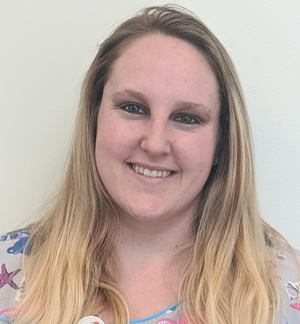
Hometown: Wapakoneta, Ohio
Undergraduate: BS in Biological Sciences, Ohio University
Graduate: Pathologists’ Assistant Class of 2017
Can you tell me a little about yourself before coming to Drexel?
I grew up in small town in northwestern Ohio, with big aspirations of entering the medical field. I gained a small taste of pathology through a program partnered with Center of Science and Industry located in Columbus, Ohio, and I absolutely fell in love. I went to Ohio University, where I explored many options within the medical field and realized being a doctor/medical examiner was not my niche. However, I quickly learned that PA/PathA was the exact field I needed to be in to utilize my anatomy and dissection skills while providing patient care!
Why did you decide to apply to Drexel’s PathA program?
After I researched the various programs available at my time of matriculation, Drexel’s program stood out due to its clinical year set up. I liked that I could choose to stay in the greater Philadelphia area, or I could volunteer to travel to various sites in different states. I also wanted to experience as many rotations as I could to absorb how different labs run and gain different perspectives on grossing from various PAs. On top of that, I liked that there were additional supporting courses during the didactic year such as Leadership and Photography.
What was your experience in the program like?
I absolutely loved my time at Drexel! The class size is big enough for collaboration but small enough to grow as an individual without becoming a number. The didactic year is grueling, but I was adequately prepared to enter my clinical rotations!
What did you like most about the program?
I thoroughly loved my clinical sites and learned so much from my various preceptors.
What was your relationship like with the PathA faculty?
I had an overall positive experience with the various PathA program faculty (though some of them changed since my time). They truly tried to cater the information and test questions to what we needed while taking courses paired with medical students. I genuinely felt like the director(s) and faculty cared about our education and the quality of students they were producing.
How was your relationship with your classmates?
I had amazing relationships with my classmates: we would study together, eat lunch together, go to weekly trivia together and support each other. Drexel does not foster a competitive environment and instead supports a collaborative environment amongst the students.
The PathA program offers a year of practical work in the field. Where did you work during that time, and what was the experience like?
My surgical pathology rotations included Abington Memorial Hospital , Einstein Medical Center and Pennsylvania Hospital. My pediatric pathology rotation was at St. Christopher’s Hospital for Children, my autopsy rotation was at the Hospital of the University of Pennsylvania and my forensic pathology rotation was at the Philadelphia Medical Examiner’s Office.
I thoroughly enjoyed every single one of my rotations. Each person I interacted with at each rotation had valuable information to share and teach me; I was an absolute sponge! I strongly believe my experiences in my clinical rotations set me up for success going into my first PA career job… and still my current PA job!
What are you doing for work now?
I am now the lead PA at The Ohio State University Wexner Medical Center, a large academic institution and cancer hospital. My primary responsibilities still include grossing simple to complex cancer resections, as well as adding quality assurance documentation, leadership within the lab training residents and PA students, coordinating shadowing opportunities for prospective PA students, and aiding my manager with various other managerial tasks when I can pull off the bench. I LOVE my job!
Would you recommend the PathA program to others who are interested in this field?
I would absolutely recommend Drexel’s program. In fact, I advocate for the PA profession and Drexel’s program when I coordinate prospective students to shadow with us. The structure of the clinical partnered with a collaborative learning environment is a great match for education!
Do you have any advice for future PathA students?
Take every opportunity you have to learn during school that you can. Go to tumor boards, attend online conferences, go to fall conference as a student delegate, and get involved and volunteer! You may not have as many opportunities for education when you begin your career due to lab staffing, rotations for conferences, or shift times not correlating with educational opportunities. When you are a student, your main responsibility is to learn, so take advantage of that!